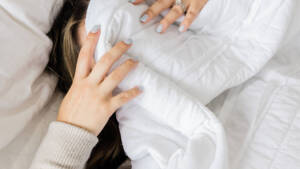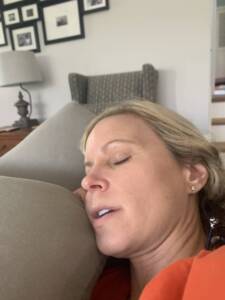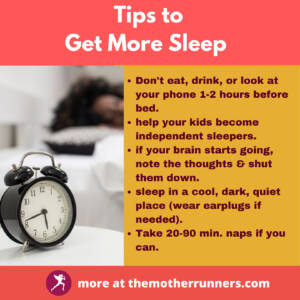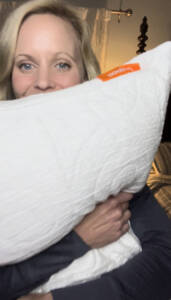When I tore my hamstring in 2019 while training for a marathon, it didn’t occur to me until much later that sleep deprivation may have led to my running injury. Now research is supporting that sleep for athletes is crucial for injury prevention.
In the summer of 2019, my mileage doubled from about 50 miles a week to 100 miles a week. I was shooting my only shot of trying to qualify for the 2020 Olympic Trials Marathon.
Related: Lessons Learned from My Injury
My Struggle with Sleep and Running Injuries

During this time, my son was still very young and not sleeping well. It would take him forever to settle down and wanted me to sit with him until he fell asleep.
I would sit in that chair with him for well over an hour most nights and try to gently lay him in his crib only for him to wake up and the process to restart. He’d also wake several times in the night and would need me to soothe him back to sleep.
Then, it would be time for me to get up and train, work, and parent. Do all the things.
Looking back on it now, it’s no wonder I got injured. I felt tired most of the time and instead of owning that I needed more sleep for all I was doing, I felt weak. I felt like other people were doing more and not needing as much sleep as me.
Related: Running on No Sleep: Do or Don’t?
Many lessons have been learned since including the importance of sleep for athletes. And now, I am careful to ensure I get enough sleep. Because now I know that athlete sleep is critical for better performance, recovery, and injury prevention, and is just an overall nicer mom and person.

Related: The Best Recovery Shoes for Runners
In this article, I survey the research on sleep and running injury prevention and speak to sleep expert Nicole Shallow on about the importance of sleep for athletes plus tips to improve your sleep. (Listen to my interview with Shallow on The Passionate Runner podcast!).
Specifically, in this article on sleep and athletes (and moms!), I will cover:
- The anatomy of a sleep cycle
- Why runners need more sleep
- How sleep deprivation can lead to injury
- The research that connects athlete sleep to injury prevention and athletic performance
- How to get sleep better, and
- Sleep solutions for moms and their families
So, let’s go!
Related: Can Collagen Help Prevent Injuries?
What happens when we sleep?
We heal when we sleep—both mentally and physically. As Shallow explains, there’s not a single system in our bodies that does not benefit from sleep.
“Sleep takes all that we did that day and helps flush everything out, remove the junk so that we are sparkly new in the morning,” she explains.
And sleep is not created equal. We go through different sleep stages that accomplish different things in your recovery.
This why some days you feel zonked even though you went to bed at the same time and woke up at the same time, or if you woke up earlier than usual and you feel edgy and terrible.
That’s all rooted in the type of sleep (sleep quality) you got the night before. So, let’s take a closer look at what happens when you sleep at night.
Related: Should You Run on No Sleep?
The anatomy of your sleep cycle

While there are variations in the architecture of sleep, here is the anatomy of a typical sleep cycle:
- Start in alert phase
- You cycle through 4 stages of sleep starting with Rapid Eye Movement and three phases of Non Rapid Eye Movement.
- A full sleep cycle is about 90-120 minutes
- NREM
- NREM comprises of 3 phases and is about 80 percent of our sleep a night
- The NREM phase 3 is when the human growth hormone is secreted and our muscles recover
- The brain is less active during NREM
- REM
- This is the phase associated with memory consolidation and dreaming
- You cycle through more of REM as the night goes on
- Brain activity increases during REM
- REM is essential for learning memory, emotional regulation, mood, emotional reactivity, and overall mental well-being. This is why when you wake up early, you are less patient and more reactive.
Both NREM and REM are important for runners but the physical recovery happens most earlier in the night during the deep restorative (NREM) phase. This is when the growth hormone is released and repair happens.
Related: 9 Reasons You Aren’t Getting Faster
Do runners need more sleep?
Yes, runners need more sleep. Athletes need more sleep. I would argue MOMS need more sleep than anyone (even though that’s close to impossible!).
Just like the everyday person, sleep is essential but for runners, the mental and physical game is a completely different level, says Shallow. To perform your best, coping with the physical and mental stressors is key, sleep can help do that for us.
By getting enough sleep, runners will improve:
- training
- motivation
- mood
- injury risk
- recovery, and
- muscle memory.
Training is causing damage and damage needs to be repaired. Research on elite athletes shows that the more sleep, the better–specifically to reduce risk of injury and improve immune functioning.
Do I need to sleep more if I run more?
Yes, you likely need to sleep more if you run more. But your body will tell you what you need, and your sleep is adaptive. Your body is smart and will adjust the stages of your sleep cycle to optimize your recovery.
So, if you had a hard workout and damaged more tissues in your body, it will likely go into a deeper sleep than usually to secrete more HGH to repair itself. How amazing is that?!
Therefore, it’s not a set number of how much sleep you need in relationship to how many miles you need. It’s quality over quantity.
But to get the recovery, you will likely need to spend more time between the sheets.
Related: How to Return to Running After Injury
How does not getting enough sleep lead to injury?
Runners secrete human growth hormone (HGH) when they sleep. This is when the damage from your running gets repaired and your body builds back stronger. This hormone secretion helps your body with:
- protein synthesis
- muscle recovery
- immunity function and
- inflammatory response regulation.
When we don’t get quality sleep from nighttime disturbances, or late training sessions or early wake-ups for training or work, we disrupt this healing cycle, putting us at risk for injury along with more emotional dysregulation, decreased motivation, and feeling of fatigue/tiredness, says Shallow.
What does the research say about sleep and athletes?
Research shows a connection between lack of sleep and the following:
- Injury and sleep. A study in the Journal of Science and Medicine in Sport looked at 95 endurance athletes, including runners, for a year. They found that the biggest increase in injuries were on those who got less than 7 hours of sleep a night. Another study in Current Sports Medicine Reports also found that less than 7 hours of sleep per night consistently increases injury risk 1.7 times.
- Pain and sleep. A meta-analysis in Current Sports Medicine Reports found that less than 7 hours of sleep a night can lead to the increased sensation of pain, and suggests sleep be part of an athlete’s recovery plan.
- Athletic performance and sleep. A study in the Scandinavian Journal of Sports Medicine found that lack of sleep negatively impacts strength, speed, and endurance in athletes.
- Bone loss and sleep. Another study in the Journal of Bone and Mineral Research found that postmenopausal women getting less than five hours per night had lower bone density compared to women who slept seven hours per night or more.
- Bad mood and sleep. Research in Physical Therapy in Sports found sleep problems can lead to mood disturbances and general health complaints.
- Fatigue and sleep. More research for the Institute of Sport and Preventative Medicine finds a connection between sleep loss in athletes and fatigue, depression, and anxiety.
- Mental acuity and sleep. Other studies have found suboptimal sleep affects a variety of cognitive factors ranging from executive function, attention, learning, mental performance, and mental health.
Note: This is just the tip of the iceberg though when it comes to the negative effects lack of sleep has on our health and wellbeing
How can you tell if you are getting the right amount of sleep?
If you wake up on your own and feel refreshed—all day—that means you’re getting enough sleep. You aren’t getting enough sleep if you feel like you:
- Need coffee to function
- Experience daytime fatigue
- Are short-tempered
- Have brain fog
- Feel unmotivated, or
- Experience overtraining syndrome symptoms including
- decreased performance despite an increased effort
- feeling tired all the time
- dreading running
- difficulty sleeping, and
- a higher resting heart rate.
How can I sleep better? How can I get more sleep?
There are lots of steps you can take to improve the quality and quantity of your sleep. And there are measures you can take to help with sleep hurdles that seem outside your control.
Related: Does Running Cause a Hormone Imbalance?
9 Tips to Get Better Sleep

Before we get to common sleep problems and sleep solutions, let’s review some tips to sleep better from Shallow.
The goal of these tips is to help you get high-quality sleep. Things like falling asleep to screens or sounds or using sleep aids will harm the quality of your sleep. Here’s how to set yourself up for success.
- Have a cool dark and comfortable environment for sleeping. Get a good pillow. (We love Lagoon Sleep. Save 15 percent with code MOTHERRUNNERS.)
- Limit liquids about 2 hours before bed to reduce the likelihood of using the bathroom in the middle of the night.
- Limit food about 2 hours before bed so your body isn’t having to work on digesting while also repairing the damage you did to it that day.
- Do not work out 2 to 3 hours or less before bedtime.
- Avoid screens about 1 to 2 hours before bedtime to help wind down and reduce blue light exposure to increase melatonin production.
- Turn off notifications at night that will affect your sleep cycle.
- Avoid substances such as alcohol or caffeine and sleeping aids such as sleeping pills before bed.
- Do something calming before bed that you enjoy. Ideally, that would be reading a book, stretching, or meditating but if watching a show helps you wind down, do it.
- Take in sunlight in the morning to help set your circadian rhythm.
Get more tips from Shallow with her free Guide to Better Sleep Hygiene.
Solutions to 5 Common Sleep Problems

My biggest issue with sleep is that, as a mom, it feels like it is out of my control. It’s not like I am doom-scrolling or Netflix binging before I shut my eyes. No, I’m laying with my kids until they fall asleep, and then going straight to bed. And then, I am waking up early to run.
But in my conversation with Shallow before we recorded our podcast, I realized, I had more control over my sleep than I thought. She helped me see that if I could help my kids sleep better at night, I would sleep better at night.
Below are some helpful solutions to sleep problems, including kids (yes, I called them a problem…).
Kids.
For a lot of parents, our kids require us to lay with them until they fall asleep or they wake us up in the middle of the night, or they wake up too early.
Shallow suggests investigating the problem first (which is something she specializes in) and making shifts to support better sleep. This involves teaching your kids how to fall asleep on their own and learn to fall back asleep at night when they hit that natural wake phase.
This is a subject that books have been written about, so I’m not going to attempt to solve kid-related sleep problems here. BUT, I will share two strategies that helped us:
- Moving bedtime up earlier so I was getting to be earlier.
- Laying with our kids for a set time before we went to bed—leaving them still awake.
Noise.
Noise created from environmental factors like a clicking fan, kids climbing into bed, or a dog barking, can wake you up, trigger that fight or flight response, and make it difficult to fall back asleep.
If you can, consider wearing noise-canceling devices such as earplugs. If you are still woken up or don’t feel comfortable sleeping with earplugs, tell yourself it’s okay to wake up and let go of the expectation that you must fall back asleep.
Sometimes this acceptance is all we need to calm our minds and allow us to slip into sleep.
Runaway brain.
I struggle with what my husband calls a “noodle brain.” I can’t stop thinking and then my brain runs away from me—I’m obsessing over my to-do list, catastrophizing problems, or start writing articles like this one in my head.
Shallow suggests not scolding yourself for having a busy mind. Instead, be okay with your thoughts but don’t get hooked. Recognize them, note them, but don’t let them overtake you. I like to put my thoughts on a to-do list. I tell myself I can think more about X tomorrow. Often, I will even make a note in my phone to do so.
Practicing mindfulness during the day can also be helpful for this. It helps calm your mind and give you the skills to stop the cascade. Shallow recommends doing a 3-to-5-minute body scan, guided meditation (I love the Calm app), sitting quietly eyes closed and watching the thoughts pass through like clouds, focusing on your five senses, yoga or even going for a gentle walk in nature.
Frequent wake-ups.
First of all, know that it’s common to wake up multiple times a night. This usually occurs at the end of a sleep cycle and if you have a fitness tracker like WHOOP, you’re already aware this is normal.
Knowing it is normal can ease stress when you think you’re missing out on quality sleep and go into panic mode.
If you are waking up and becoming alert multiple times a night, investigate the causes:
- are you drinking too much liquid before bed?
- are you drinking alcohol?
- are you snacking too close to bedtime?
- are you getting unnecessary notifications on your phone?
- is there a noise that’s interrupting your sleep?
These are all potential causes of unnatural awakenings and most have an easy fix.
Technology.
Technology can help us fall asleep by offering sleep stories through apps like Calm. But in most cases, it disrupts our sleep by keeping our minds going when we are responding to emails or texts at bedtime, reading the news, scrolling social media, or emitting blue light which messes with our circadian rhythms.
If you have a difficult time falling or staying asleep, try staying off your phone for two hours prior to bedtime and moving it into a different room or a location away from your nightstand. You may be surprised by how much improved your sleep quality will be.
Should I take a nap?
Finally, a word about naps.
Repeat after me, you are not weak or lazy if you take a nap. Naps are a tool to help you do everything you do. They can keep you strong for your family. And they are much more effective than that afternoon cup of coffee.
So, ain’t no shame in the nap game.
Shallow recommends the following tips for naps:
- Keep a nap between 20 and 90 minutes otherwise you may encounter sleep inertia (grogginess and disorientation).
- Aim to have a nap earlier in the day to not negatively impact your night’s sleep.
- And try to commit to the nap but without stress. Even just lying down for 20 minutes and closing your eyes is beneficial.
I have found that I fall asleep when I tell myself I’m just going to “rest my eyes” for a few minutes rather than try to force myself to sleep.
If you don’t have the opportunity to nap, getting outside in the sun will give you an energy boost.
Unfortunately, there’s no way to train your body to perform on less sleep. If you don’t have time to get more than 7 or 8 hours of sleep a night, focus on quality over quantity.
Your running and your family will thank you for it.
If you want guidance with your training, including returning to running after injury, check out my run coaching services. Also, be sure to check out my free training plans:
- Postpartum Training Plan
- After a Break Training Plan
- 5k Training Plans
- 10k Training Plans
- Half Marathon Training Plans
- Marathon Training Plans
- Strength Training Plan
